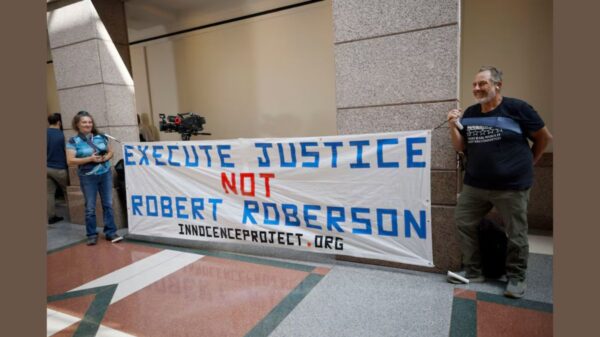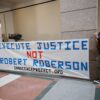By Michaela Rush

Last week, the Dallas Board of Adjustment deeply disappointed La Bajada residents when the panel of five ruled unanimously against the neighborhood’s zoning ordinance in favor of new homeowners.
Following the vote, neighbors and advocates quickly and silently exited the City Council chambers.
“This was a really good opportunity for city leaders to step up, and we didn’t see that from anyone,” says John Gallegos, La Bajada Neighborhood Community Association secretary. “If they do allow all these houses, they’re going to take us out of the neighborhood. It sucks because we don’t know our future anymore in the neighborhood.”
Gallegos was one of eight speakers during the Aug. 15 Board of Adjustment meeting who opposed property owner Lance Thames’ request for an exception to the height of his new home at 3349 Coronet. The La Bajada community created a Neighborhood Stabilization Overlay more than 10 years ago, limiting the height of homes in the neighborhood to 27 feet. The plans for Thames’ home extend to 32-feet, a height erroneously approved by a city contractor.
Prior to the vote, community members and housing advocates reinforced their reasons for creating the NSO to the board, and also cited concerns with the city’s enforcement of the overlay, rising property values, and the growing number of large homes within the neighborhood.
Maria Lozada Garcia, who spoke at the July 18 meeting, compared the city’s negligence in enforcing policies to standing by while the neighborhood is raped.
“That is why it is so extremely personal to me and to every resident living in La Bajada,” Garcia says. “By granting this height in variance you are permitting the rich and wealthy to rape the working class community of La Bajada. But make no mistake, we are not victims, we are fighters.”
Prior to the vote, Board of Adjustment member Jay Narey said the final decision was difficult, but reflected the limited authority of the group.
“Unfortunately, we are required to operate within certain parameters and to change those parameters is the ultimate authority of the city council itself,” Narey said. “I too am very disheartened that the city made mistakes in this case, but I don’t feel that the owners should be punished for that mistake, which will be extremely costly.”
In his comments to the board, Thames shared a variety of correspondence from the city, showing that officials did not catch the potential height violation until after a permit was issued and construction was underway. Though neighbors expressed sympathy toward the owner for the city’s inconsistency, Janie Cisneros of the Singleton United neighborhood association said that allowing the variance would not solve the city’s NSO enforcement issue.
“I know all about paying high costs due to city errors. Me and my neighbors are currently paying for city errors to this day,” Cisneros told the board, alluding to Singleton United’s ongoing battle against policies and zoning that allows the GAF industrial plant to remain in their community. “Don’t set a precedent by approving this height. Don’t open the doors for more of these future exceptions that can result in these mega homes being built in traditional working-class neighborhoods.”
In 2005 the City of Dallas was sued under similar circumstances in City of Dallas v. Vanesko, where the city approved a building permit in error and homeowners requested a variance from the Board of Adjustment. In that case, the Vaneskos’ neighbors were supportive of the variance, but the board denied it. The city took the case all the way to the Texas Supreme Court, setting the precedent that cities can enforce a zoning ordinance, even when a city had given preliminary approval of a substantially completed new home.

Housing advocate Evelyn Mayo, Rayo Planning director, spoke during the board meeting, and says the city’s choices about where to allow and deny exceptions can have grave consequences for residents.
“Decisions [about enforcement] shorten lives and they undermine any potential for generational wealth, and jeopardize the viability of entire communities,” Mayo says. “The protective rules seem to hardly ever apply or get enforced in low income neighborhoods. The exceptions to rules always seem to be in favor of higher income people.”
La Bajada Neighborhood Community Association and neighbors are trying to appeal the quasi-judicial board’s decision at the county or district court level, and have until Monday, Aug. 28, according to West Dallas City Councilmember Omar Narvaez’ office. Garcia says neighbors sought help from the Dallas Volunteer Attorney Program and Legal Aid of Northwest Texas and were denied, with both agencies citing a lack of resources to be able to assist.
Gallegos says the fight for the neighborhood will continue, as West Dallas has a special place in his heart and the city’s history.
“I’m 33, I never envisioned myself being involved with the city and these types of topics, but I’m passionate about where I live. Multiple generations [of my family] are from there and we’re products of that neighborhood,” Gallegos says. “The people from this neighborhood built the levees, they built Dallas, and it’s sad that the city is not taking that into consideration, from a historical point of view.”
Dallas Free Press has requested an interview with Board of Adjustment Chairman Dave Neumann or other available board members but it is not yet scheduled. Narvaez said via email that he couldn’t comment further until after the appeal deadline had passed.
“City officials cannot comment on the board’s decision until all appeals are exhausted because the case may be remanded back to the Board,” stated an email response from Narvaez’ office. “Because the Board acts in a quasi-judicial capacity, Board members can only receive information on an active case at the hearing. Therefore, comments from Council Members could be viewed as trying to influence the outcome of a pending case. City officials, including council members and board members, cannot comment until this case has been finally resolved.”









You must be logged in to post a comment Login